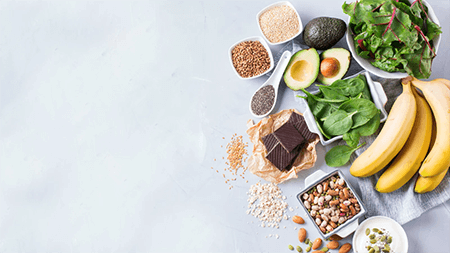Magnesium and zinc are two essential minerals for the human body. They play an important role in many bodily functions, such as blood pressure regulation, energy production, and bone health. In this article, we'll look at the benefits of magnesium and zinc to the body and how you can increase your intake of these important minerals.
The role of magnesium in the body
Magnesium is an essential mineral that is needed for many bodily functions. Here are some of the important roles that magnesium plays in the body:
1. Regulation of blood pressure – Magnesium can help regulate blood pressure by relaxing blood vessels and reducing vascular resistance.
2. Power Generation – Magnesium is necessary for the production of energy in the body, as it is involved in the regulation of ATP, the main source of cellular energy.
3. Bone health – Magnesium is important for bone health because it is involved in bone formation and regulation.
4. Muscle function – Magnesium is important for muscle function as it is involved in muscle relaxation.
5. Blood sugar regulation – Magnesium can help regulate blood sugar by helping cells use insulin efficiently.
Magnesium-rich foods
It is important to get enough magnesium in your diet to support important bodily functions. Here are some magnesium-rich foods:
1. Spinach – Spinach is an excellent source of magnesium, with about 157 mg of magnesium for one cup of cooked spinach.
2. Almonds – Almonds are a good source of magnesium, with about 80 mg of magnesium per ounce of almonds.
3. Lawyers – Avocados are a good source of magnesium, with around 58 mg of magnesium per cup of avocado.
4. Bananas – Bananas are a good source of magnesium, with about 32 mg of magnesium for a medium banana.
The role of zinc in the body
Zinc is an essential mineral that is needed for many bodily functions. Here are some of the important roles that zinc plays in the body:
1. Immune system – Zinc is important for the immune system because it is involved in the production of immune cells.
2. Bone health – Zinc is important for bone health because it is involved in the regulation of bone formation.
3. Growth and development – Zinc is important for growth and development, especially during pregnancy and childhood.
4. Brain function – Zinc is important for brain function as it is involved in the regulation of neurotransmission and memory.
5. Skin health – Zinc is important for skin health as it is involved in regulating wound healing and collagen formation.
Zinc-rich foods
It is important to get enough zinc in your diet to support important bodily functions. Here are some zinc-rich foods:
1. Oysters – Oysters are an excellent source of zinc, with about 74 mg of zinc per six medium oysters.
2. Red meat – Red meat is a good source of zinc, with about 5 mg of zinc per three-ounce serving.
3. Pumpkin seeds – Pumpkin seeds are a good source of zinc, with about 2,6 mg of zinc per ounce of seeds.
4. Seafood – Seafood such as crabs, lobsters and shrimps are a good source of zinc.
How to Increase Your Magnesium and Zinc Intake
If you are not consuming enough foods high in magnesium and zinc, you may want to consider taking supplements to increase your intake of these important minerals. It is important to consult a healthcare professional before taking any supplements, as excessive doses can be toxic.
Phytomisan products offer a range of natural supplements to increase your magnesium and zinc intake, such as marine magnesium and zinc bisglycinate. These supplements are formulated with high quality ingredients to ensure optimal absorption and effective utilization by the body.
Conclusion
Magnesium and zinc are two essential minerals for the human body, playing an important role in many bodily functions. It is important to consume enough foods rich in magnesium and zinc to support these bodily functions, and supplements can be taken to increase intake of these important minerals. Phytomisan products offer a range of natural supplements to increase your intake of magnesium and zinc, to support a healthy and balanced life.

